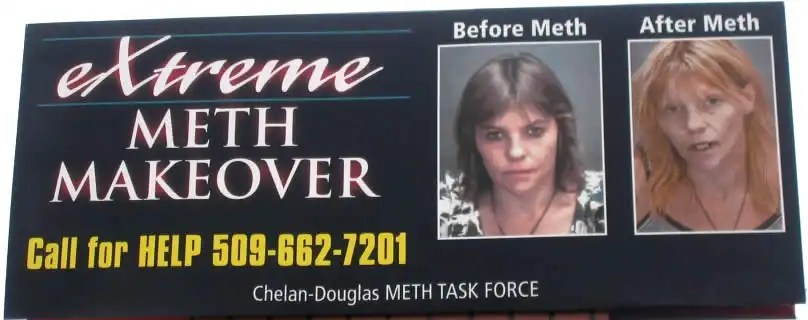Methamphetamine
Methamphetamine, also known as "meth," "crank," or "speed," is a potent central nervous system stimulant that is harmful to the human body and can be addictive. Possession, manufacture, or distribution is illegal in the United States and many other countries.
What's an Illegal Lab?
An illegal meth lab is a laboratory set up to make the illegal drug methamphetamine. The lab may be located anywhere activities can be hidden from view. For example, illegal meth labs have been found in storage units, motel rooms, trailer parks, apartments, and houses.
Several techniques are used to produce methamphetamine. All the processes use a variety of chemicals that can be harmful, including explosives, solvents, metals, salts, and corrosives. During the drug manufacturing process (also called "cooking"), additional toxic compounds and by-products are produced. The fumes, vapors, and spillage associated with cooking can all be toxic.
Possible Health Effects
The risk of injury from chemical exposure depends on nature of the chemical itself (including its concentration and quantity), the length of time of exposure, and how the chemical enters the body. Chemicals may enter the body by being inhaled, swallowed, injected (by a contaminated needle or accidental skin prick), or absorbed by the skin.
- Acute Exposure: An acute chemical exposure occurs over a relatively short period of time and may be harmful to health.
- An acute exposure to high levels of contaminants found in meth labs causes shortness of breath, coughing, chest pain, dizziness, lack of coordination, tissue irritation, and burns of skin, eyes, mouth and nose. Acute exposure can even cause death. Acute reactions of this nature could occur during or immediately after a drug bust, before the lab has been aired out.
- Less severe symptoms resulting from a lower level exposure include headache, nausea, dizziness, and fatigue. Symptoms sometimes occur in people who have entered a drug lab after a bust, but before the property has been adequately cleaned and aired out. Symptoms usually go away after several hours away from the chemicals.
- Corrosive Effects: Corrosive substances may cause injury when they contact skin or are inhaled. Symptoms may include shortness of breath, coughing, chest pain and skin burns.
- Solvents: Solvents can irritate the skin, mucous membranes and respiratory tract, and can cause central nervous system effects. Solvents may burst into flame or explode.
- Chronic Exposure: Chronic exposure occurs over an extended period of time - weeks, months, or years. Chronic health effects usually appear after a long period of time, possibly years. Not much is known about the chronic health effects of these substances, but scientific studies show the chemicals used to make meth can cause a range of health effects. These include cancer; damage to the brain, liver and kidneys; birth defects; and complications of pregnancy, such as miscarriage.

Recommendations
- No one should enter a place that has been used as an illegal drug lab without appropriate personal protective equipment, until the area has been aired out and decontaminated.
- No one should occupy any space that has been used as an illegal drug lab until the property has been decontaminated. Be aware that once a building has been used as an illegal drug lab, no decontamination process can guarantee to make it totally safe to live in.
- If you suspect a dwelling or property may be an illegal lab, contact the local police or sheriff's department.
- If you own property that has been used as an illegal lab and want a list of chemicals found at the site, contact the law enforcement agency responsible for processing the lab. That may be the local police or sheriff, Idaho Department of Law Enforcement, or Federal Drug Enforcement Administration.
- If you have questions about indoor contamination, clean-up, and/or health effects possibly related to illegal labs, contact your local district health department. You also may contact the Idaho Division of Health, Bureau of Environmental Health and Safety at 208-334-0606.
- If you have questions about outdoor contamination and clean-up, contact the Idaho Division of Environmental Quality at 208-373-0198.
- Idaho Poison Center: 1-800-860-0620.

